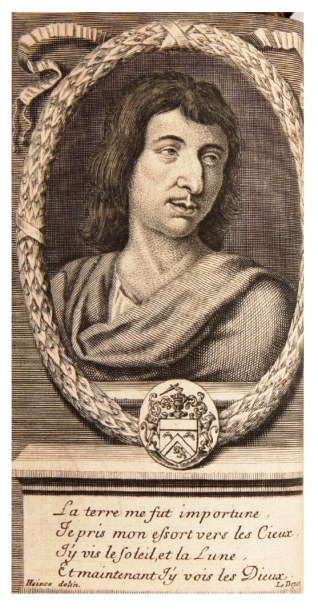THIS YEAR marks the 400th anniversary of the birth of Cyrano de Bergerac, but not the one you have in mind. Edmond Rostand’s hit play of 1897 invented an ultra-Romantic Cyrano, a magniloquent swashbuckler with a promontory of a nose. Hopelessly in love with his cousin Roxane, he sacrifices himself so she may wed the man she loves, ghost-writing his rival’s amorous declarations. This Cyrano—master duelist, improvisatory poet, independent spirit—has entered the popular imagination and spawned scores of imitations.
This character, however, has little to do with the historical Cyrano—least of all the love story. Savinien Cyrano, later de Bergerac, born in Paris in March 1619, was a poet and a swordsman, true, but he was also a sodomite. He belonged to the second generation of libertins, not libertines in the modern sense, but free thinkers. The term comes from the Latin libertinus, an emancipated Roman slave, for these gallants felt free to throw off the trammels of Christianity and conventional morality. In reaction to the Wars of Religion and the Church’s attempt to institute a Counter-Reformation in France, they bragged of their attachments to atheism and sodomy in scurrilous verse.

The ringleader of these “forceful minds” (esprits forts) was the gifted poet Théophile de Viau. His blasphemies and boasts of “unnatural” sex shocked the godly, in particular two Jesuits who intrigued to get him banished from Paris. His exile was eased by the companionship of Jacques Des Barreaux, a nineteen-year-old of surpassing beauty and intelligence. They were inseparable, but when they had to be apart, they sent each other passionate love letters in Latin. After a year, Viau was allowed to return to the capital, but the implacable Jesuits employed a rent boy (who shared the bed of one of them) to render daily reports on his activities.
The last straw was Viau’s collection of exceptionally scabrous poems, Le Parnasse satyrique (Satirical Parnassus). In its opening verse, the poet complains of being so eaten up with syphilis that he vows henceforth only to fuck arses. (It was Viau’s recurrent complaint that whenever he gave up sex with boys, he would contract the clap.) He was condemned to be burned at the stake and his ashes scattered to the winds. Since the accused had skipped town, he was burned in effigy; after Viau’s arrest in Picardy and incarceration in an insalubrious dungeon, Des Barreaux renounced him and urged him to repent. (Wilde and Bosie come to mind, especially since Viau wrote a long reply in verse reminiscent of De Profundis.)
After two years’ imprisonment, condemned to lifelong exile and confiscation of his property, Viau reconciled with his younger lover, but, broken by his misfortunes, died shortly thereafter (another Wilde parallel). Des Barreaux, who boldly carried on the libertin tradition and lived into his seventies, became known as “the widow of Théophile.”







